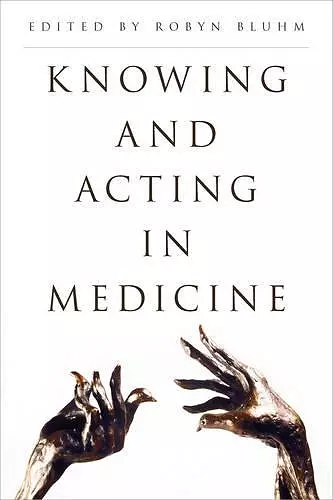Knowing and Acting in Medicine
Format:Paperback
Publisher:Rowman & Littlefield International
Published:7th Dec '16
Currently unavailable, and unfortunately no date known when it will be back
This paperback is available in another edition too:
- Hardback£127.00(9781783488094)

What roles do different kinds of knowledge play in medicine? What roles should they play? What standards (epistemic, ethical, practical) should be met before knowledge is used to develop policy or practice? Medical decision-making, whether in the clinic or at the policy level, can have serious and far-reaching consequences. It is therefore important to base decisions on the best available knowledge. Yet deciding what should count as the best available knowledge is not easy. This important book addresses philosophical questions about what kinds of knowledge should be taken into account, and how knowledge should inform practice and policy. The chapters in this volume examine the relationship between knowledge and action in medical research, practice, and policy. "Knowledge" is broadly construed to include knowledge from clinical, laboratory, or social science research, and from the clinical encounter, as well as broader background assumptions prevalent in society that inform both the kinds of knowledge that are taken to be relevant to medicine and how that knowledge is interpreted in decision-making. Such knowledge may be relevant not only to clinical decision-making with regard to the care of individual patients, but also to the practice of scientific research, the development of policy and practice guidelines, and decisions made by patients or by patient advocacy groups.
The epistemology of medicine is a field of growing interest and importance. These 14 original essays explore the relationship between knowledge and action in medical practice, research, and policy. The collection identifies important challenges to the currently dominant paradigm, which holds up randomized clinical trials and evidence-based medicine as the gold standard for evaluating medical knowledge and practice. Essays examine such issues as the role that intuition and individual experience play in understanding and evaluating clinical reasoning, the proper role of humility in epistemic judgment, and how patients and the public understand and can contribute to medical knowledge. Although predominantly from the US, the contributors have a diverse range of national backgrounds (UK, Canada, France, Australia, Netherlands). Editor Bluhm (Lyman Briggs College, Michigan State Univ.) and most of the contributors are philosophers, but psychiatry, nursing, and medicine are also included. Clearly written and well presented, this volume makes a significant contribution to the field of medical epistemology…. [E]ach essay includes a valuable list of references for further research. Summing Up: Highly recommended. Upper-division undergraduates through faculty and professionals. * CHOICE *
"The hallmark of great academic work is that it makes difficult and important ideas accessible. Whether you're steeped in the debates about medical epistemology and ethics or coming to the subject anew, this collection has something to say to you. Authors explain, analyse and (crucially) advance current understandings of the problems facing medical practice: a refreshing, serious and significant contribution." -- Michael Loughlin, Professor of Applied Philosophy, Department of Interdisciplinary Studies, Manchester Metropolitan University
Despite the variety of topics, several themes recur throughout the book that deserve attention and are of interest for bioethicists, as well as for many other health officers (doctors, nurses, administrators, policy makers). In fact, the book explores the historical and scientific bases of several hot topics in today’s medicine . . . as well as a comprehensive and up-to-date perspective on the art of medicine. This book . . . provides a conceptual framework for a modern approach to medicine as an art that is respectful of patient perspectives and values, as well as of the various tools of medicine. * Theoretical Medicine and Bioethics *
"This outstanding collection demonstrates that some of the most fascinating and persistent philosophical problems arising in medicine are epistemic, rather than ethical. Topics range from how research studies are designed to how core medical concepts ought to be defined, and engage issues as wide-ranging as adherence in HIV/AIDS research, vaccine hesitancy, and the care of patients with Ebola." -- Kirstin Borgerson, Associate Professor of Philosophy, Dalhousie University
"The hallmark of great academic work is that it makes difficult and important ideas accessible. Whether you're steeped in the debates about medical epistemology and ethics or coming to the subject anew, this collection has something to say to you. Authors explain, analyse and (crucially) advance current understandings of the problems facing medical practice: a refreshing, serious and significant contribution." -- Michael Loughlin, Professor of Applied Philosophy, Department of Interdisciplinary Studies, Manchester Metropolitan University
These essays on the epistemology of medicine are at the cutting edge of the field. They explore medical knowledge, broadly construed to include researcher, clinician, patient, and media perspectives. There are several examples of how evidence and values are intertwined in decision making. The collection is of interest to both medical and philosophical audiences. -- Miriam Solomon, Professor of Philosophy, Temple University
This outstanding collection demonstrates that some of the most fascinating and persistent philosophical problems arising in medicine are epistemic, rather than ethical. Topics range from how research studies are designed to how core medical concepts ought to be defined, and engage issues as wide-ranging as adherence in HIV/AIDS research, vaccine hesitancy, and the care of patients with Ebola." -- Kirstin Borgerson, Associate Professor of Philosophy, Dalhousie University
These essays on the epistemology of medicine are at the cutting edge of the field. They explore medical knowledge, broadly construed to include researcher, clinician, patient, and media perspectives. There are several examples of how evidence and values are intertwined in decision making. The collection is of interest to both medical and philosophical audiences. -- Miriam Solomon, Professor of Philosophy, Temple University
- Winner of Choice Outstanding Academic Title 2017
ISBN: 9781783488100
Dimensions: 229mm x 151mm x 19mm
Weight: 408g
268 pages